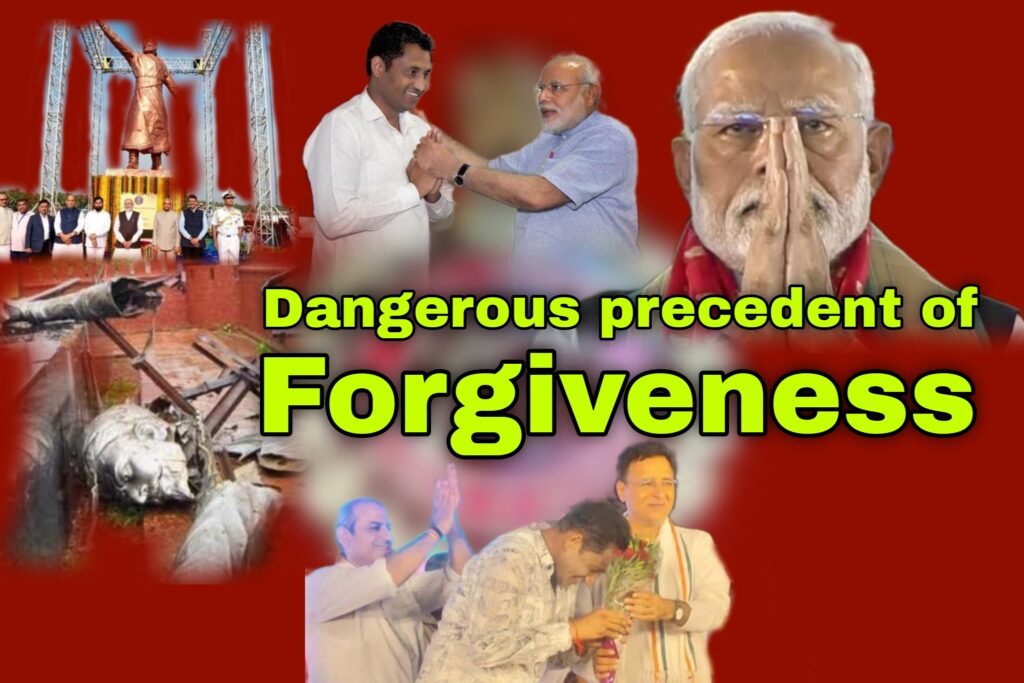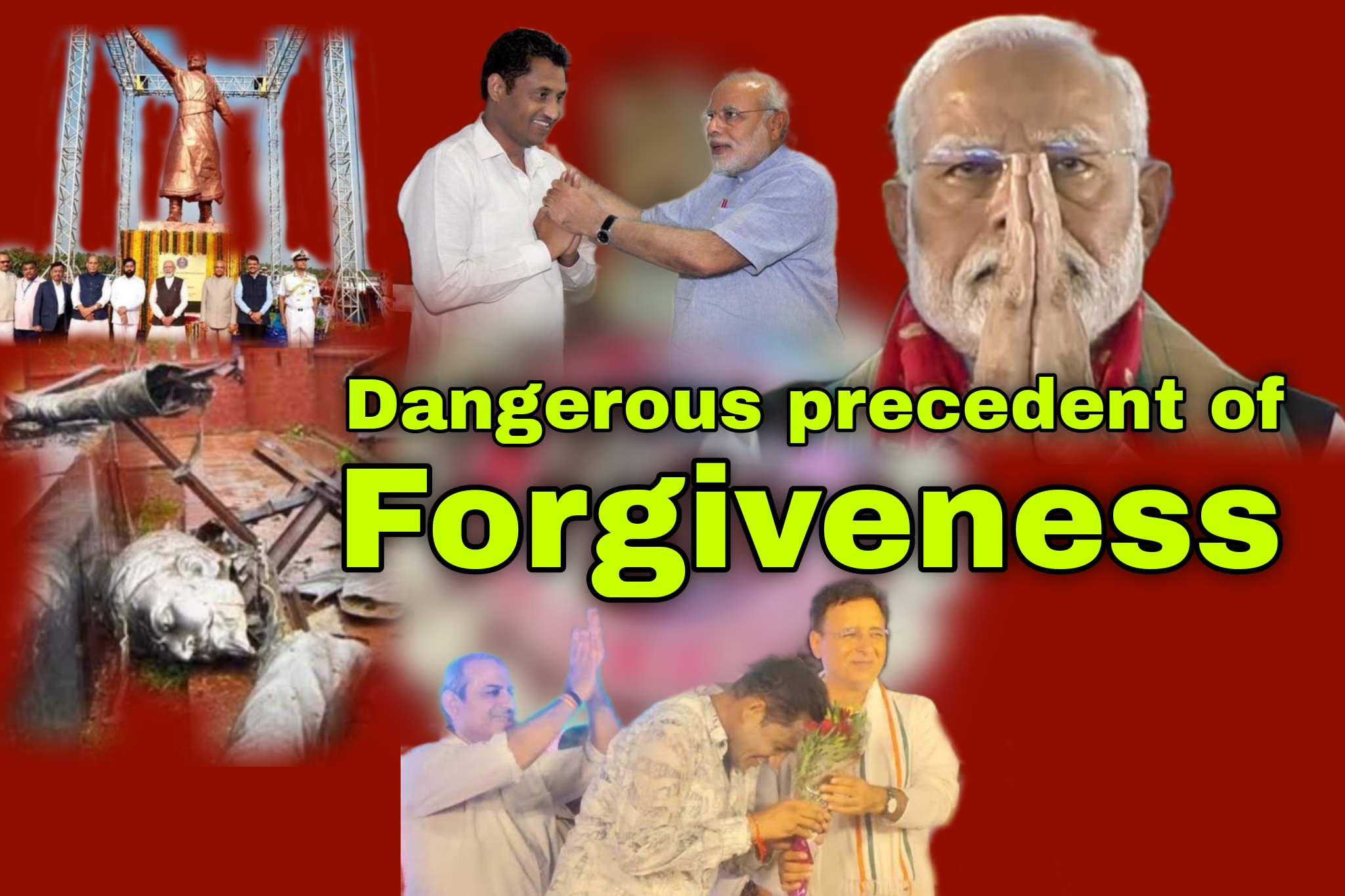
In the complex landscape of Indian politics, forgiveness and apologies have become tools that can reshape narratives, alter perceptions, and in some cases, sweep egregious offenses under the rug. The recent developments surrounding Rocky Mittal, a former critic-turned-Congressman, and the ₹3,300 crore scam associated with the collapse of Shivaji Maharaj’s statue, highlight a disturbing trend where forgiveness is weaponized to bypass accountability.
Forgiving Rocky Mittal: A Case of Political Expediency
Rocky Mittal, once notorious for his caustic, personal attacks on Rahul Gandhi and his family, now finds himself within the ranks of the very party he once vilified. His songs, laced with insults, ridiculed Sonia Gandhi and Rahul Gandhi, branding the latter as a “fool” and questioning his very identity. Yet, despite years of vitriol, Mittal is now a Congressman, having been granted a place in the party after offering an apology.
This shift raises significant questions about the ethics of forgiveness in politics. While it is commendable for individuals to exhibit magnanimity, especially in personal matters, the implications of such forgiveness in the political realm can be far-reaching. The Gandhi family’s decision to forgive Mittal and welcome him into the party may reflect their personal values, but it also sends a message that deep-seated enmity and slander can be erased with a simple apology if political expediency dictates it.
The Broader Implications of Political Forgiveness
The practice of forgiving political adversaries, especially those who have engaged in personal attacks, sets a dangerous precedent. It creates a culture where politicians and public figures can engage in harmful rhetoric or unethical behavior without fear of lasting consequences. All they need to do is switch sides or offer a public apology to be absolved. This not only undermines the gravity of their actions but also erodes public trust in the political system.
More troubling is the potential for such forgiveness to normalize corruption and malfeasance. The ₹3,300 crore scam linked to the construction and subsequent collapse of Shivaji Maharaj’s statue is a glaring example. The Prime Minister’s plea for forgiveness in the face of such a massive scandal is not just an admission of guilt but an alarming indication that accountability is being replaced by a culture of impunity.
The ₹3,300 Crore Scam: A Testament to Corruption and Its Consequences
The collapse of the Shivaji Maharaj statue, constructed at an astronomical cost of ₹3,300 crores, is emblematic of the deep-rooted corruption plaguing Indian governance. This statue, meant to honor a revered historical figure, has instead become a symbol of the state’s failure to safeguard public funds and uphold the values of transparency and accountability.
Prime Minister Narendra Modi’s request for forgiveness in connection to this scam is deeply concerning. It suggests that those in power believe they can commit grave wrongdoings and escape with nothing more than an apology. The notion that an apology can suffice in such a case, where taxpayers’ money has been misused and public trust betrayed, is not only unacceptable but also dangerous. It signals that justice can be subverted, and those responsible can avoid the consequences of their actions.
The Erosion of Accountability and the Rule of Law
This trend of using apologies to sidestep accountability is not limited to the Shivaji statue incident. It reflects a broader pattern where the rule of law is increasingly overshadowed by political convenience. If a ₹3,300 crore scam can be brushed aside with a request for forgiveness, what message does that send to the perpetrators of other crimes? It implies that accountability is negotiable, and that the powerful can rewrite the rules to suit their needs.
The implications for Indian society are profound. When leaders and officials are allowed to operate with impunity, it erodes public faith in the institutions meant to protect them. It fosters a climate where corruption becomes the norm, and the principles of justice and fairness are sacrificed at the altar of political expediency.
The Perils of Power Abuse
If the next government fails to deliver the harshest punishment to leaders and officials who misuse their power by bypassing the courts and ordering the demolition of opponents’ homes with bulldozers, it will set a perilous precedent. This would undoubtedly embolden those who see the law as a tool for personal vendettas rather than a mechanism for justice.
The unchecked use of state machinery to settle political scores or suppress dissent not only undermines the rule of law but also corrodes the very foundation of democracy. When such actions go unpunished, it sends a clear message that power trumps justice, and that the law can be twisted to serve the interests of the powerful.
If the next government does not take a firm stand against these practices, it will effectively legitimize the “law of revenge”, where retribution, not justice, becomes the guiding principle of governance. This would create a society where might makes right, and the rule of law is replaced by the rule of fear and intimidation.
Such a shift would have devastating consequences for the fabric of Indian society. It would erode public trust in the justice system, deepen societal divisions, and encourage a culture of impunity among those in power. In the long run, this could lead to an escalation of conflict, as those targeted by state-sanctioned actions seek to retaliate, further entrenching cycles of violence and retribution.
To prevent this, the next government must ensure that those who abuse their power face the full weight of the law. Accountability must be enforced, not only to provide justice for those wronged but also to uphold the principles of democracy and the rule of law. Only by doing so can the government restore public confidence and ensure that the law serves all citizens equally, without fear or favor.
The Role of Media and Judiciary in Upholding Justice
In this context, the role of the media and judiciary becomes crucial. Unfortunately, both have often fallen short of their responsibilities. The media, which should serve as the watchdog of democracy, has at times become complicit in downplaying or ignoring these issues. Similarly, the judiciary, which is supposed to act as the guardian of justice, has been criticized for its selective action and inaction.
For instance, the judiciary’s silence in the face of such blatant corruption and misuse of power is disheartening. The collapse of the Shivaji statue should have prompted immediate legal action, rigorous investigation, and accountability at the highest levels. Instead, what we witness is a normalization of corruption, with apologies replacing the legal consequences that should follow such scandals.
A Call for Genuine Accountability
India stands at a critical juncture where the very principles of democracy and governance are being tested. The dangerous precedent of forgiveness in politics must be challenged, and those responsible for corruption and other crimes must be held accountable, regardless of their position or influence. The public, media, and judiciary must collectively demand transparency, integrity, and justice, ensuring that apologies cannot replace accountability.
The ₹3,300 crore scam and the political rehabilitation of figures like Rocky Mittal highlight the urgent need for a recalibration of our values. Forgiveness may have its place in personal matters, but in the realm of public service and governance, accountability must always come first. Only then can we hope to build a society where justice prevails, and the rule of law is truly upheld.

